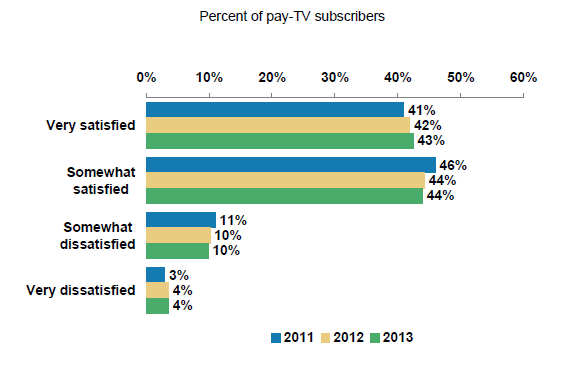Viva la TV Bundle!
The smarter way to stay on top of the multichannel video marketplace. Sign up below.
You are now subscribed
Your newsletter sign-up was successful
It’s a question that has perplexed many: Why hasn’t the Internet punctured the TV business the way it has decimated music sales?
A few weeks ago in USA Today, media psychoanalyst Michael Wolff penned one of those the-sky-is-falling-for-the-pay-TV-industry pieces you see from time to time. He predicted that, thanks to the rise of over-the-top video services and growing irritation with paying for a bundle of (mostly unwanted) channels, cable TV will either die or have one foot in the grave within five years.
“The cable programming business -- running, practically speaking, on consumer inertia -- doesn't work anymore, and shouldn't,” he wrote in the essay. “It's too costly and inefficient. It will die.”
Is pay TV headed for a digital cliff? Will a la carte win the day, killing the TV bundle the way iTunes killed the CD (a “song bundle”)?
So far, the Chicken Little predictions haven’t come to pass.
Pay TV households were flat at about 99 million households in 2013, and the bulk of them are still happy (see chart), according to Morgan Stanley’s survey of about 2,500 U.S. adults released last week. Indeed, pay TV customer satisfaction increased in 2012, according to J.D. Power.

Storm clouds loom, though [cue ominous background music]. Aggravated by rising prices, millions are flirting with the idea of junking their pay TV plans.
The smarter way to stay on top of the multichannel video marketplace. Sign up below.
But here’s the deal: As long as the industry doesn’t shoot itself in the foot, pay TV bundles will live on quite comfortably.
In a smart analysis published Friday, Sanford Bernstein senior analyst Todd Juenger pointed out that TV is more like radio than recorded music. From 1999 to 2009, radio revenue declined about 17% from 1999 to 2009 -- far less than the 60% crash in CD sales caused by the disruptive twins of Napster (piracy) and iTunes (digital music sales).
“Why would any self-respecting young person who grew up in the Internet age continue to listen to the radio?” Juenger asked rhetorically. “We see at least three reasons: 1) discovery (of new songs/artists); 2) live, fresh daily content (including talk radio: sports, conservative, religious); and 3) local information. (We believe TV provides these same benefits.)”
Panicked by piracy, music companies couldn’t keep their bundle (the CD) together -- they were forced to sell songs a la carte. As long as piracy doesn’t become a significant pain point for the likes of HBO, TV networks don’t have an incentive to bail on the pay TV model.
Meanwhile, pay TV still represents a terrific value relative to the alternatives, according to Juenger, an assertion borne out by continued high satisfaction ratings. If you assume the average cable, satellite and telco TV bill is about $75 per month, that nets out to $0.30 per hour (given average of 8 hours of viewing per day), whereas VOD pricing for shows is $2 per show for less than an hour of content, he noted.
“From a consumer point of view, the sheer magnitude of TV consumed by the average TV household makes the bundle economically attractive,” Juenger wrote. “Even if all the content the consumer wanted was available on demand, in order to break even the consumer would have to watch WAY less TV content (and perhaps supplement with OTT content), while also forfeiting the option value provided by the bundle of 300 channels available at any time,” Juenger wrote.
I’d also point out that consumption of music is very different from TV. People typically don’t want to own an episode of a TV show (unlike music, which you listen to repeatedly), which is another reason why subscription TV services have remained successful (e.g., cable TV and Netflix).
Wolff, by the way, has cord-cutting aspirations -- again, like millions of others who also claim they do -- but he’s still a cable TV subscriber.
“When will I sort bills and take steps and finally stop paying for cable? I will… tomorrow,” he wrote.
Sure, maybe. But talk is cheap, and the evidence shows that the pay TV bundle isn’t easily displaced. As long as it maintains a good value proposition, something the industry must stay intensely focused on, it won’t be shuffling off this mortal coil anytime soon.
Follow me on Twitter: xpangler
